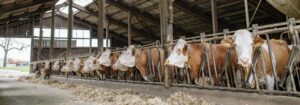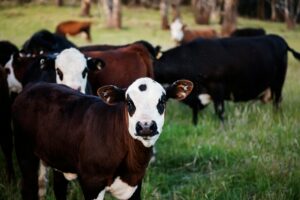Introduction
“Farming calls for a number of skills, amongst which is the need to manage the labour force professionally and with the necessary sensitivity. The farmer is often employer, human resource manager, social worker and even mentor – all roles originating from a close relationship and involvement in the lives of labourers and their families.” Mr Lourie Bosman, previous Agri SA President
Local business environment
There are 284 283 commercial farming households in South Africa, some 40 000 of which are registered for VAT (Sihlobo, 2025). 6 500 of these are considered large farms. Over 50% of agricultural employment and two thirds of income are concentrated in those 6 500 farms (DALRRD, 2020).
Employment in primary agriculture was pegged at 906 000 jobs in the second quarter of 2025 (Agbiz, 2025).
South Africa follows the global trend of commercial agriculture where economies of scale are essential to be sustainable. This is why we have fewer farmers on larger farms, and these units are becoming more and more capital intensive.
Most producers in this country are price takers. Difficult farming conditions and the absence of subsidies have led the farmer to weigh every worker’s productivity carefully.
The increased use of technology has led to reduced employment opportunities. These changes were necessary for farmers to remain competitive and profitable in the global environment. (If farmers don’t do this they will go out of business and won’t produce food or employ anybody!)
Legislation regarding minimum wages and security of tenure has been introduced to protect poor and illiterate individuals from being exploited. Unfortunately these measures are also unintended disincentives for hiring permanent workers and accommodating them on farms in terms of housing. The number of seasonal workers has increased at the expense of permanent positions.
The permanent workers employed by farmers also increasingly live off-farm, resulting in pressure on expanding rural townships and informal settlements. The contributions formerly made by farmers (housing, infrastructure and services) now are the problem of local government. The farm worker community’s off-farm housing and living conditions requires attention from all stakeholders.
Sources: Agricultural Employment Brief; Portfolio Committee on Agriculture, Rural Development and Land Reform, 15 July 2020; and the ILO report "Farm Workers’ Living and Working Conditions in South Africa: key trends, emergent issues, and underlying and structural problems".
Further reference:
- Sihlobo W. 2025, August 18. “South Africa’s agricultural jobs growth possibilities.” Agbiz. Available at https://agbiz.co.za/blog/details/south-africas-agricultural-jobs-growth-possibilities
- Download the “Futures of Agricultural Employment in South Africa 2035” report, done for the Department of Trade, Industry and Competition by Stellenbosch University’s Institute for Futures Research.
***
The Laborie Dialogue Initiative (LDI), a memorandum of understanding (MOU) was signed in 2015 between HORTGRO and VinPro, and the national trade union in agriculture, the Food & Allied Workers’ Union (FAWU). Its aim was to improve labour relations.
The Fruit Industry Value Chain Round Table (FIVCRT) is a partnership (principle commitment) between government, the fruit industry and labour to secure “an enduring competitive advantage” for the South African fruit sector.
***
Some perspectives
Progressive farmers have taken great strides in balancing worker’s rights with their own needs, resulting in more highly skilled workers, who can help farmers become more efficient.
Source: Prof Nick Vink, Stellenbosch University
Staff training
By submitting a workplace skills plan (WSP), employers can claim as much as 70% of their skills levy back. Several AgriSETA-accredited trainers are happy to do the paper work for you. Examples of course possibilities include:
- Drive a tractor (5 days)
- Forklift operator (5 days)
- Pig production/Animal care (5 days)
- Occupational health and safety (2 days)
- Health and safety representatives (2 days)
- First aid level I and II (2,5 days)
- Basic supervising skills (2,5 days)
- Basic fire fighting (2,5 days)
- HIV/Aids awareness (2 days)
- 6M simulation (2,5 days)
Apprenticeships and learnerships offer you, the employer, certain tax breaks – and a labour force which is more skilled. Find information at www.agriseta.co.za. In accordance with laid-down rules, AgriSETA will also fund certain staff training. Find AgriSETA-accredited training providers under the “Role players” heading and at www.agriseta.co.za
Farm Worker Housing
The development of agri-villages is a partnership between the farmer, the farm worker and the state. An agri-village is considered a private settlement of restricted size, established and managed by a legal institution situated within and/or near an agricultural area and where residence is restricted to bona fide farm workers and their dependents on the farms involved in the development. Under these arrangements, security of tenure does not include right of ownership, but can include trust, communal property association or sectional title.
Housing subsidies
The institutional subsidy can help to raise the standard of farm worker housing. Find details of housing subsidies on the Department of Human Settlements website www.dhs.gov.za. Municipalities can also offer assistance. Find the Western Cape Provincial Government’s “Municipal Guideline for responding to farm residents housing needs in the Western Cape” on the Internet.
There are tax deductions for farmworker housing. Find out more from your bookkeeper.
Deducting housing from a farm worker’s salary
Legally this can be done when the following requirements are met (and not before):
- The worker must be at least 18 years old
- Water, electricity and other services are not also deducted
- The amount deducted is not more than the cost to the employer
In addition:
- The house has a roof that is durable and waterproof;
- The house has glass windows that can be opened;
- Electricity is available inside the house if the infrastructure exists on the farm;
- Safe water is available inside the house or in close proximity, which is not more than 100m, from the house;
- A flush toilet or pit latrine is available in, or in close proximity, to the house; and
- The house is not less than 30 square meters in size.
Source: The Department of Employment and Labour’s Basic Guide to Deductions (Farm Workers)
Labour-related legal legislation
See the separate “Legal aid and legislation” page.
The conditions of employment and minimum wages for farm workers in South Africa are regulated by the Sectoral Determination No 13: Farm Worker Sector. It stipulates that:
- Farm workers should not work more than 45 hours per week and not more than 15 hours overtime per week.
- Farm workers are entitled to have three weeks paid annual leave, one day’s paid sick leave for every 26 days worked, three days responsibility leave per annum and four months maternity leave.
- A farmer may deduct an amount not exceeding 10% of a farm worker’s wage for a house supplied to the farm worker and may not deduct for the grazing of a farm worker’s livestock.
- Farmers are required to give farm workers pay slips and written particulars of employment.
The National Minimum Wage Act sets the minimum wage for workers, from March 2025, at R28.79 per hour (a 45-hour week = R5182.20 per month). Exemptions are Expanded Public Works Programme workers (R15.83 per hour). Read the post “Minimum wage exemption process” at www.agribook.co.za/national-minimum-wage-nmw-exemption-process.
Find out about the Employment Tax Incentive offered by the South African Revenue Service (SARS) for hiring young people. The contact centre number is 0800 00 7277.
National strategy and government contact
Agriculture is one of the sectors to which government is looking in its quest to create jobs. It is important to bear in mind that the targets set by the National Development Plan (NDP) are employment targets across the value chain, not for primary agriculture alone. Labour intensive industries such as citrus, table grapes, apples, macadamias, pecans and avocadoes have all already expanded beyond the NDP targets (see the annual BFAP Baselines).
- Department of Employment and Labour (DEL) www.labour.gov.za (several documents, necessary forms and useful guides are available on the website)
- Department of Agriculture www.nda.gov.za
Further reference:
- The Parliamentary Monitoring Group sometimes features the minutes and presentations from meetings discussing farm workers, farm dwellers and farmers. Examples can be found at https://pmg.org.za/committee-meeting/42035 (12 November 2025), https://pmg.org.za/committee-meeting/40795 (2025, May 27), and https://pmg.org.za/committee-meeting/39913 (2024, November 20).
- Support for children of farmworkers in some cases includes adopting farm schools. Children of farmworkers receive bursaries for their high school and tertiary education. See SA News report (2021, March 10).
Role players
View the Premium Listings below (scroll down or click on “Premium Listings” on the Table of Contents to the right).
Further reference:
Associations
- Details of employer organisations and labour unions can be found on the “Organised agriculture” and “Legal aid and legislation” pages.
Legal services
- See the legal aid page.
Websites and publications
Among the many documents of interest on the Department of Employment and Labour website are Basic Guide to Pay Slips (Farm Workers), Basic Guide to Deductions (Farm Workers), Basic Guide to Overtime (Farm Workers), Basic Guide to Working Hours (Farm Workers), Basic Guide to Working on Sundays (Farm Workers), and Basic Guide to Public Holidays (Farm Workers).
https://smelaboursupport.org.za is a free-to-use web tool to help smaller businesses with labour relations processes and matters
Statistics can be found at www.nda.gov.za. website of the Department of Agriculture. Included are:
- Number of farm employees and domestic servants on farms
- Employment in agriculture, hunting, forestry and fishing
The Workforce is Agri SA’s e-labour desk, your e-guide on labour issues from employment contracts to dismissals. Find the link to it in the monthly Agri SA newsletter.
The Best practice reference manual for wool sheep farming in South Africa includes notes on subjects like “Basic conditions of employment”, “Occupational health and safety” and “Skills development”. Find the document, in English or in Afrikaans, on www.capewools.co.za and www.nwga.co.za.
Download the Guide to the Law and Best Practice in transporting farm workers in the South African agricultural industry.
Finance and Farmers ISBN 0-620-11949-7, available from Standard Bank.
If you produce for export, you will need to be familiar with the GlobalG.A.P. Risk-Assessment on Social Practices (GRASP) checklist. These involve the conditions of labour on the farm. Find these at www.globalgap.org.
A number of very useful documents can be found on the Sustainability Initiative of South Africa (SIZA) website, www.siza.co.za. These include Guide to the Law and Best Practice in transporting farm workers in the South African agricultural industry, the SIZA Guide to health and safety management, the Accommodation Guide, Housing Guide, Farm Access Protocol etc.
The International Labour Organisation released a report on the living and working conditions of farm workers in South Africa in 2015. Find Farm Workers’ Living and Working Conditions in South Africa: key trends, emergent issues, and underlying and structural problems at several places on the Internet including www.ilo.org and www.idll.uct.ac.za.
Going for broke: The fate of farm workers in arid South Africa offers a comprehensive overview on the fate of farm workers. It goes back to the early Cape history of the master-servant relationship to a discussion of the professionalisation of farm workers, which has gained momentum over some time. The book is published by the Human Sciences Research Council (HSRC). Find it at www.hsrcpress.ac.za.
Some articles
- Du Kriel G. 2025, December 06. “Cost-of-living crisis deepens pressure on households and agriculture.” Farmer’s Weekly. Available at www.farmersweekly.co.za/agri-news/south-africa/cost-of-living-crisis-deepens-pressure-on-households-and-agriculture
- Rajgopaul D. 2025, February 5. “South Africa’s national minimum wage set to rise to R28.79 per hour from March 1, 2025”. IOL. Available at www.iol.co.za/business/jobs/south-africas-national-minimum-wage-set-to-rise-to-r2879-per-hour-from-march-1-2025-04a54931-f74a-45be-ab28-90d0d472edd3
- Arnoldi M. 2025, February 4. “Agri SA appreciates balanced approach to latest minimum wage increase of 4.4%”. Engineering News. Available at www.engineeringnews.co.za/article/agri-sa-appreciates-balanced-approach-to-latest-minimum-wage-increase-of-44-2025-02-04
- Tembo P. 2025, January 16. “Minimum wage hike: Striking a balance for farmers and workers”. Food for Mzansi. Available at www.foodformzansi.co.za/minimum-wage-hike-striking-a-balance-for-farmers-and-workers
- Staff Reporter. 2024, December 17. “Calls for social welfare interventions among farmworkers”. Food for Mzansi. Available at www.foodformzansi.co.za/calls-for-social-welfare-intervention-among-farmworkers/
- Neethling B. 2024, June 30. “Minimum wage warning for South African businesses”. Daily Investor. Available at https://dailyinvestor.com/business/56074/minimum-wage-warning-for-south-african-businesses
- Sihlobo W. 2024, May 14. “South Africa’s primary agricultural employment lifted in the first quarter of 2024”. Available at www.agbiz.co.za/article/south-africas-primary-agricultural-employment-lifted-in-the-first-quarter-of-202
- Bassier I & Ranchod V. 2024, May 7. “Minimum wage for South African farm workers: study shows 2013 hike helped reduce poverty even though compliance was poor”. The Conversation. Available at https://theconversation.com/minimum-wage-for-south-african-farm-workers-study-shows-2013-hike-helped-reduce-poverty-even-though-compliance-was-poor-229204
- Staff Writer. 2024, February 2024. “New national minimum wage will impact jobs in agricultural sector – Agri EC”. AlgoaFM. Available at www.algoafm.co.za/agriculture/new-national-minimum-wage-will-impact-jobs-in-agricultural-sector-agri-ec
- Isaacs L. 2023, August 14. “Culpable homicide case opened after farmworker dies in fall from tractor trailer”. Eye Witness News. Available at https://ewn.co.za/2023/08/14/culpable-homicide-case-opened-after-farmworker-dies-in-fall-from-tractor-trailer
- Read our blog “Putting the safety of people first” (2022, November 25).
- Van der Walt J. 2021, April 30. “Health and safety do’s and don’ts for farmers”. Farmer’s Weekly. Available at www.farmersweekly.co.za/farm-basics/how-to-business/health-and-safety-dos-and-donts-for-farmers/
- Reporter. 2021, January 28. “Farm owners urged to ensure safe transport for workers”. SA News. Available at www.sanews.gov.za/south-africa/farm-owners-urged-ensure-safe-transport-workers
- LWO Employers Organisation. 2018. “Record working hours for peace of mind”. Available at www.agriorbit.com/record-working-hours-for-peace-of-mind
- Erasmus, D. 2018, July 20. “Let’s talk about farmworkers”. Farmer’s Weekly. Available at www.farmersweekly.co.za/opinion/blog/letter-from-the-editor/lets-talk-farmworkers/
- Janeke, A. 2018, January 6. “Hoe moet boere begrafnisse op plase hanteer? [How should farmers deal with burials on the farm?]” Landbouweekblad. Available at www.netwerk24.com/landbou/Nuus/hoe-moet-boere-begrafnisse-op-plase-hanteer-20180105
- Hornby, D. 2017, November 16. “How farm dwellers in South Africa think about home, land and belonging”. The Conversation. Available at http://theconversation.com/how-farm-dwellers-in-south-africa-think-about-home-land-and-belonging-86939
- Small, A. 2017, July 18. “Enforcing a disciplinary code in the workplace”. Farmer’s Weekly. Available at www.farmersweekly.co.za/farm-basics/how-to-business/enforcing-disciplinary-code-workplace/
International
- International Farmworkers’ Forum www.farmworkersforum.org
- International Labour Research and Information Group www.ilrig.org






